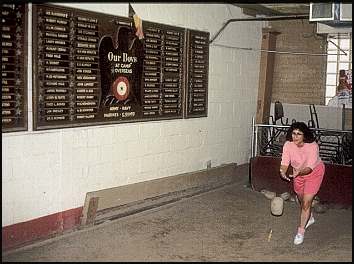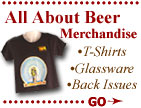
| ||||
| AAB Departments |
| ...Beer Features |
| ...Beer Talk |
| ...Pull Up A Stool! |
| ...What's Brewing |
| ...Beer Travelers |
| ...Stylistically Speaking |
| ...Beer & Food |
| ...Homebrewing |
| ...Collectibles |
| ...Marketplace |
| Beer Lovers' Resources |
| ...World Beer Festival |
| ...Brew Cruise Info |
| ...AAB Merchandise |
| ...AAB Bookstore |
| ...Beer Links |
| About the Magazine |
| ...Subscription Info |
| ...Retail the Magazine |
| ...Advertising Info |
| ...Contact AAB |

|

A feather bowling participant in action at the Cadieux Cafe
They put the 'keg'
in kegling
by Daria Labinskyand Stan Hieronymus
Bryant Lake Bowl is not your typical bowling center. Rolling Stone magazine would not have called it one of the hot places to visit in Minneapolis last summer were it typical, nor would Kalamazoo Brewing Co. president Larry Bell have hosted a beer tasting there.
Bryant Lake dates back to when such places were called bowling alleys (now the preferred term is bowling center), when they were neighborhood hangouts run by moms and pops. Bowling is a major attraction here, but so are the restaurant, the adjoining music room/theater and even the beer menu.
Beer and bowling have long been linked, with breweries sponsoring tournaments and bowlers finding in the game another excuse to share companionship over a cold one. But at the same time that bowling was booming, the postwar de-flavoring of American beer was taking place.
In 1963 the United States boasted 10,883 bowling alleys, yet 30 years later that number had dwindled to 7,250, according to the American Bowling Congress. Many of the smaller bowling venues have been replaced by huge, high-tech, chain-owned family bowling centers, with computerized scoring and video screens. Those that have survived have done so by being distinctive. The best of them are not only decidedly non-corporate, but they serve non-industrial beer as well. Although often considered a blue-collar pastime, bowling has become as much a sport of white-collar workers in recent years, so by serving craft-brewed beer, bowling lanes improve their chances for survival by reaching out to younger, more affluent bowlers.
Occasionally, a traditional bowling center such as Landmark Lanes in Milwaukee (2220 N. Farwell Ave.), will offer a nice tap selection in its bar, but the places that are really special tend to be smaller. They've become everybody's favorite "secret," and therefore no longer a secret. Anybody who's been to Southport Lanes in Chicago must tell a half-dozen friends about the pinboys, and each diner at the Cadieux Cafe in Detroit, home of feather bowling, is forever an ambassador for the Belgian restaurant.
Bowling is one thing that makes these places special, flavorful beer is another. We have found that owners who go to the trouble to make at least two things special (like beer and bowling) run joints where everything tends to be done right.
Bryant Lake Bowl
810 W. Lake, Minneapolis, MN
612-825-7109
It's not often you see someone enjoying Boon Framboise while bowling, but on a visit to Bryant Lake Bowl, that's what we found. The bowling area has eight lanes and is lit with fluorescent lights, and the plastic benches and chairs are well-worn. Posted above a rack of bowling balls is a picture of Roger, "the awesome pinsetting guy." A sign noting "Roger is in" (or out) keeps you informed. During the off hours, games are only 50 cents; otherwise, they're $1.75.
Even if you don't bowl, you'll want to visit for the beer, or the food, or the live music. Beers from Minnesota's own Schell and Summit and fine English imports are among the draft choices, at $3.50 a pint. The bottle selection ranges from Brazil's Xingu Black Beer to Belgium's Rodenbach Red to Bell's Stout from Kalamazoo, Mich. Bryant Lake Bowl also offers a variety of wines by the glass and bottle. The restaurant area is a relaxed coffeehouse, with tables and chairs in front of tall windows. Overlooking it is a 25-foot-long Art Deco mahogany bar dating to 1937. Food choices include vegetarian chili, pasta, salads and a create-a-plate, which lets you combine breads, cheeses, spreads and meats. It's also open for breakfast, with organic oatmeal and create-an-omelets among the offerings. The theater, with small tables at the front of the stage and traditional theater seats behind, features eclectic live music.
Southport Lanes
3325 N. Southport, Chicago
312-472-1601 Southport Lanes is an institution and an attraction, because it's home to the last handset bowling lanes in Chicago. Whenever bowling is going on, you'll see the pants-clad legs of the pinboys sticking out at the ends of the four lanes as they hurriedly set up the pins. A sign warns bowlers, "Remember, if you see legs, don't bowl." There's open bowling after 9:45 p.m., when it costs $14 an hour per alley.
During the week, Southport Lanes is pretty much a neighborhood hangout. On weekends, it's a different story. "Who knows where they come from?" said co-owner Steve Soble. "There are a lot of cabs." The wait to bowl can be long then, but the pool room has plenty of tables, and there are air hockey tables, too. Or, you may just want to sit in front of the long, dark-wood back bar and admire the nifty decorations -- advertising signs, postcards of Old Chicago, old newspapers and an impressive selection of stuffed fish. But remember, bowlers, "No Shoes on the Bar." There's seating on the sidewalk out front in season. The 11 draft selections include Sierra Nevada Pale Ale, Guinness, Redhook E.S.B., Oregon I.P.A., Newcastle Brown Ale, a seasonal selection from Kalamazoo Brewing and other craft beers. The bottle list should further satisfy the adventurous. Food choices include sandwiches and salads.
The tavern is in a former Schlitz bar -- dating back to before Prohibition, when breweries were allowed to own and run bars -- and still has a classic terra cotta Schlitz ball high on the side of the building. The current owners acquired the bar in 1991, cleaned it up and upgraded the beer menu. The neighborhood was already on the rise, and it wasn't long before bowlers faced a wait almost every night.
Now, Southport employees can suggest would-be bowlers try Lucky Strike (2747 N. Lincoln), which opened late last summer. "We did 350 parties (in 1995) and turned away that many more, so we were looking for a place (where) we could carry over that concept of giving people something to do." It turned out to be another bowling alley. This one has eight lanes and an early-generation automatic pinsetter -- plus 13 beers on tap. The top-selling craft beers are Goose Island's Honkers Ale and Sierra Nevada Pale Ale.
Cody's Public House
1658 W. Barry, Chicago
312-528-4050
A few blocks south of Southport Lanes is Cody's Public House, a small neighborhood tavern with a lovely Mission oak back bar, a wall lined with glass brick, a pressed-tin ceiling, an old oak piano, a few pool tables, and bocci ball whenever the weather's favorable. In this Italian favorite, players try to roll their balls close to a target ball while simultaneously trying to knock the opponents' balls away from the target ball. "I figured it would bring in some of the people I'd like to have in," said owner Gene Frankowski, who took over the bar -- another pre-Prohibition tavern -- nine years ago. "It's a game women like to play. In that regard, it's similar to pool, but without the arguing."
You won't go thirsty here, with draught beers including Fuller's E.S.B., Guinness, Bass and Sierra Nevada Pale Ale at $3.25 a pint. Frankowski is in the process of adding four more taps, all for craft beers. The dim lighting and year-round Christmas lights lend a warm, comfortable atmosphere.
Cody, by the way, is Frankowski's golden retriever. He's 10-1/2 years ago and last year fathered a litter of nine. Frankowski gave eight away, and now Cody Jr. helps patrol the bar. Other dogs are welcome.
Oh yes, and be sure to check out the Lava Lamps, and the mural of cherubs in the ladies' room.
Cadieux Cafe
4300 Cadieux, Detroit
313-882-8560
It's safe to say that the Cadieux Cafe is one-of-a-kind, at least in the United States. This Belgian restaurant in Detroit boasts the only feather bowling lanes in the United States. Feather bowling originated in Belgium. It's similar to bocci ball, only the target is a pigeon feather rather than a ball, the lanes are concave and made of clay covered with sawdust, and the object rolled is a 3-pound wooden wheel. The player whose wheel comes closest to the feather scores highest. The game is a lot more difficult than it sounds. A well-tossed wheel will weave from one side of the alley to the next, past the wheels that have already been tossed, and plop down beside the feather.
Detroit had the largest Belgian colony in the United States when the cafe was built before Prohibition. Originally, it had one outdoor lane, then two, and finally the lanes were enclosed. Robert and Yvonne Devos, who emigrated from Belgium to Detroit because they already had family in the area, bought the restaurant in 1962. Now their son, Ron, and Ron's nephew own the place.
"We had a couple of tough years," Devos said. "Bowling helped carry us." Now the lanes are booked weekends almost a year in advance. If you want to see experienced bowlers at play, Thursday is league night.
Mussels are the specialty here, prepared a half-dozen ways. The menu also features a variety of other seafood, sandwiches and steaks. The Belgian beer list is extensive, with bottle selections including several Chimays and many lambics. Six draft choices include Michigan craft beers and quality imports.
Along the wall at one end of the alleys is a large display listing "Our boys at camp and overseas," with the names of neighborhood boys who became soldiers.
This column originally appeared in All About Beer Magazine in May 1996.
© 1996 Chautauqua Inc.









